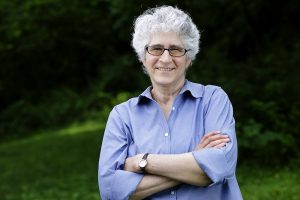Today is the last stop of Lynn Kanter’s virtual book tour celebrating her new novel, Her Own Vietnam. Click the link to check out the other tour stops, each with unique content!
Could you tell me a little about the origins of Her Own Vietnam? How did you begin this work?
Like most members of the Baby Boomer generation, my youth was profoundly shaped by the war in Vietnam – and by the movement to end it. We had a military draft then, and the Vietnam war could reach into almost any American home that had a teenage son, including mine. (I have an older brother.) I was also deeply shaken in 1970 when college students peacefully protesting on their own campuses at Kent State and Jackson State were killed by uniformed troops.
Decades after the war ended, I was walking down the street one day when it struck me: What would it be like to be a regular middle-aged woman, just living your humdrum life, and have that experience in your past? To have participated in a war so hated by much of your nation that the hostility slopped over onto you and your comrades, the very people your country sent to wage the war?
How would you feel? Who would you tell? Who could ever understand what you’d been through?
To explore these questions, I began to write. I worked on Her Own Vietnam, on and off, for the next 14 years.
How is Her Own Vietnam different from your previous novels?
My other two novels focused on situations I knew something about or could easily imagine. This novel took me into a totally unfamiliar world, one where it was important to ensure that the details and tone were accurate. I had to do a good deal of research before I could even begin to write. And then I had to imagine my way into that world and those characters.
The details of thoughts, feelings, and visuals in and after Vietnam are amazing. Did you do any research to help you make Her Own Vietnam come to life?
I never served in the military and I’m not a nurse, so I had to do a lot of research. I started by reading everything I could find about women who served in Vietnam. It surprised me to discover there wasn’t that much.
Then I joined a listserv for women Vietnam veterans, and there I met – virtually at first and then in real life – a group of remarkable women. They shared their stories and memories, and answered my many questions.
When you’re a novelist, you have to ask very specific questions to understand not only the big picture but the tiny details. What did it feel like? What did it smell like? Was the sun in your eyes? What did you carry in the pockets of your uniform?
From this listserv, did you learn how difficult is it for veterans to make contact with those they knew in Vietnam once they are in the United States?
I learned how overjoyed the women were to be able to find and connect with one another once the Internet came into people’s lives. Many women said that the conversations they had on the listserv were the first time they had ever talked about their Vietnam experiences. Another event that continues to bring women veterans together in ways both joyous and somber is the program that takes place each Veterans Day at the Vietnam Women’s Memorial in Washington, DC.
I think male veterans had more avenues to stay in contact if they chose; for instance, many military units have regular reunions. For the women veterans, it was much harder to find one another. They tended to be more disconnected from the military once they left the service, and would be unlikely to participate in reunions, hang out at the VFW hall, or run into each other in the waiting room at the local VA hospital – in part because the VA medical system offered such meager services for women. And many of the women who served later married and changed their names, making it even more difficult to track them down.
Have any veterans read Her Own Vietnam?
Yes, I asked three women veterans to read drafts of the novel and share their comments and corrections with me. Two were U.S. Army nurses who had served in Vietnam. One was a civilian who had served on a U.S. Army base in Vietnam as a librarian. I wanted these women to help make sure I had gotten it right – both the specific details about their daily lives in Vietnam, and their feelings and experiences after the war.
One of the nurses, Chris Banigan, kept up a long and detailed email correspondence with me during the early years when I was doing research for the novel. She generously shared her vast knowledge and experience, from specifics about how nurses learned to deal with gunshot wounds (they treated a live, anaesthetized goat who had been shot for that purpose), to the details of her recurring nightmares about the war. Sadly, she died several years ago, still in her fifties. A quote from her serves as the epigraph in the beginning of the book.
The other nurse, Mary Reynolds Powell – who had written a powerful nonfiction book about her own experiences in Vietnam – provided an endorsement or “blurb” that appears on the book cover. Ann Kelsey, the librarian, provided important fact-checking and directed me to other research resources.
Could you talk a bit about the relationship between Anne and Rosalind and how their same-sex marriage ties in with other themes in the novel?
The “present day” of Her Own Vietnam takes place in February 2003, just before the U.S. invaded Iraq. At that time, even long-term committed couples like Anne and Rosalind would never have dreamed of being able to marry. New York State, where the characters live, did not legalize same-sex marriage until 2011.
And yet, Anne and Rosalind’s relationship is the most stable one in the Brown family. Both Della and her mother had conventional marriages that didn’t last. I think the realm of love and marriage is one more arena in which Della followed all the rules but learned to her grief that the rules themselves were broken. Her younger sister Rosalind, perhaps with Della’s experience as a model, never let the rules define her.
Same-sex relationships have always appeared in literature, from the Greeks to today. I think we will soon start to see another version: the routine depiction of same-sex couples who are married. These stories will not be about the struggles and suffering they encounter simply because they dare to love someone of the same sex. I predict – I hope – the difficulties faced by earlier generations of lesbians and gay men, including my own, will very quickly start to seem quaint. But perhaps the couples who come of age knowing that marriage is an option will have other challenges and experiences that are new to fiction and new to social life in America.
The narrator mentions that after coming home from Vietnam, Della struggles with alcohol dependency. However, the novel doesn’t go into detail about that point of her life. What led you to this choice?
I felt that Della’s reliance on alcohol was a symptom of the damage the war did to her, not a central theme of her life, so I tried to delicately trace her history with drinking. We know that in high school some of the cool kids drank, like Della’s boyfriend, but that she did not. Even after she finishes nursing school and deploys to Vietnam, Della doesn’t drink. But in Vietnam she learns to drink – to numb the pain and because alcohol is available everywhere. After the war Della drinks far too much, but she deals with her drinking a few years later. I was trying to portray someone who was not destined to be an alcoholic but took a detour there when the pain of her life drove her to seek solace or, short of that, oblivion.
Her Own Vietnam will be released this November. Could you tell readers why your novel might make a good Book Club Pick?
It’s a novel about women’s lives – the kind of women you don’t often read about. Della, the main character, is a Vietnam veteran, and the damage from that war has gone spiraling through her life and the life of her family – and the country. This is one of the few novels that talks about the lifelong impact of war in a woman’s voice.
The book also depicts the characters in different stages of their lives. Readers get to know Della and her friend Charlene when they are in their early twenties in Vietnam, and again three decades later, when they are both middle-aged mothers in the midst of long careers. We see all of the major characters in mid-life, when their concerns and yearnings are just as vital and urgent as when they were young.
I think the book will give book clubs a lot to discuss and debate, on issues both personal and literary. If the group wants more guidance, members can read discussion questions and resources for veterans on my website HERE. If your book club has some great discussion topics, let me know so I can add them to my list!
~~~
 Lynn Kanter is the author of the novels Her Own Vietnam (2014, Shade Mountain Press), The Mayor of Heaven (1997) and On Lill Street (1992), both published by Third Side Press. Her short fiction has appeared in the anthologies Lost Orchard (SUNY Press), Breaking Up is Hard to Do, and The Time of Our Lives: Women Write on Sex After 40 (both Crossing Press), and the literary journal Verbsap. Her nonfiction has appeared in Referential Magazine and the anthologies Coming Out of Cancer (Seal Press), Testimonies (Alyson Publications) and Confronting Cancer, Constructing Change (Third Side Press).
Lynn Kanter is the author of the novels Her Own Vietnam (2014, Shade Mountain Press), The Mayor of Heaven (1997) and On Lill Street (1992), both published by Third Side Press. Her short fiction has appeared in the anthologies Lost Orchard (SUNY Press), Breaking Up is Hard to Do, and The Time of Our Lives: Women Write on Sex After 40 (both Crossing Press), and the literary journal Verbsap. Her nonfiction has appeared in Referential Magazine and the anthologies Coming Out of Cancer (Seal Press), Testimonies (Alyson Publications) and Confronting Cancer, Constructing Change (Third Side Press).
Lynn is a lifelong activist for feminist and other progressive causes, and has the T-shirts to prove it. Since 1992 Lynn has worked as a writer for the Center for Community Change, a national social justice organization. She lives with her wife in Washington, DC.
![[PANK]](https://pankmagazine.com/wp-content/themes/pank/assets/images/pank-logo-large.png)

